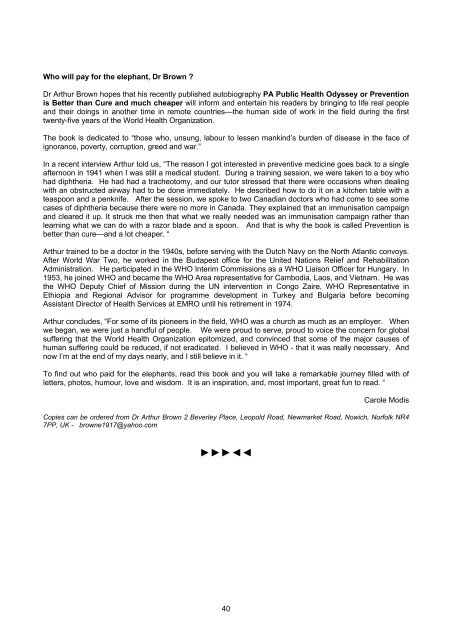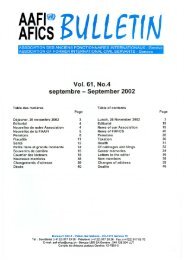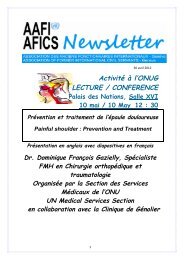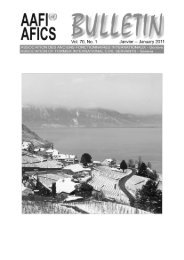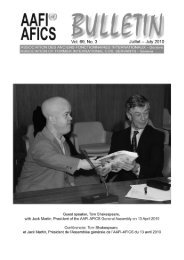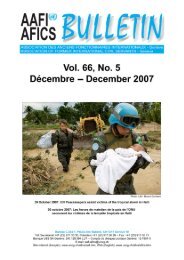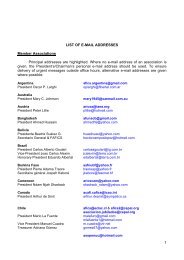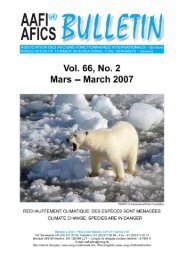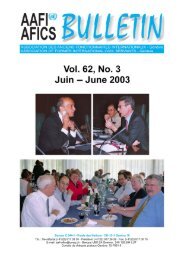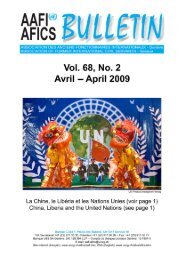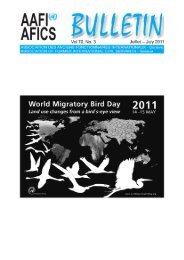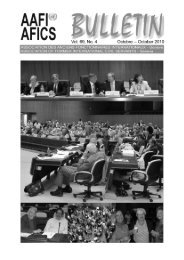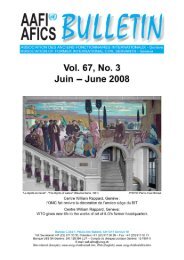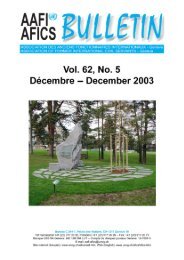VOL. 65, NO. 2 Mars â March 2006 - AAFI-AFICS, Geneva - UNOG
VOL. 65, NO. 2 Mars â March 2006 - AAFI-AFICS, Geneva - UNOG
VOL. 65, NO. 2 Mars â March 2006 - AAFI-AFICS, Geneva - UNOG
Create successful ePaper yourself
Turn your PDF publications into a flip-book with our unique Google optimized e-Paper software.
Who will pay for the elephant, Dr Brown ?Dr Arthur Brown hopes that his recently published autobiography PA Public Health Odyssey or Preventionis Better than Cure and much cheaper will inform and entertain his readers by bringing to life real peopleand their doings in another time in remote countries—the human side of work in the field during the firsttwenty-five years of the World Health Organization.The book is dedicated to “those who, unsung, labour to lessen mankind’s burden of disease in the face ofignorance, poverty, corruption, greed and war.”In a recent interview Arthur told us, “The reason I got interested in preventive medicine goes back to a singleafternoon in 1941 when I was still a medical student. During a training session, we were taken to a boy whohad diphtheria. He had had a tracheotomy, and our tutor stressed that there were occasions when dealingwith an obstructed airway had to be done immediately. He described how to do it on a kitchen table with ateaspoon and a penknife. After the session, we spoke to two Canadian doctors who had come to see somecases of diphtheria because there were no more in Canada. They explained that an immunisation campaignand cleared it up. It struck me then that what we really needed was an immunisation campaign rather thanlearning what we can do with a razor blade and a spoon. And that is why the book is called Prevention isbetter than cure—and a lot cheaper. “Arthur trained to be a doctor in the 1940s, before serving with the Dutch Navy on the North Atlantic convoys.After World War Two, he worked in the Budapest office for the United Nations Relief and RehabilitationAdministration. He participated in the WHO Interim Commissions as a WHO Liaison Officer for Hungary. In1953, he joined WHO and became the WHO Area representative for Cambodia, Laos, and Vietnam. He wasthe WHO Deputy Chief of Mission during the UN intervention in Congo Zaire, WHO Representative inEthiopia and Regional Advisor for programme development in Turkey and Bulgaria before becomingAssistant Director of Health Services at EMRO until his retirement in 1974.Arthur concludes, “For some of its pioneers in the field, WHO was a church as much as an employer. Whenwe began, we were just a handful of people. We were proud to serve, proud to voice the concern for globalsuffering that the World Health Organization epitomized, and convinced that some of the major causes ofhuman suffering could be reduced, if not eradicated. I believed in WHO - that it was really necessary. Andnow I’m at the end of my days nearly, and I still believe in it. “To find out who paid for the elephants, read this book and you will take a remarkable journey filled with ofletters, photos, humour, love and wisdom. It is an inspiration, and, most important, great fun to read. “Carole ModisCopies can be ordered from Dr Arthur Brown 2 Beverley Place, Leopold Road, Newmarket Road, Nowich, Norfolk NR47PP, UK - browne1917@yahoo.com►►►◄◄40


